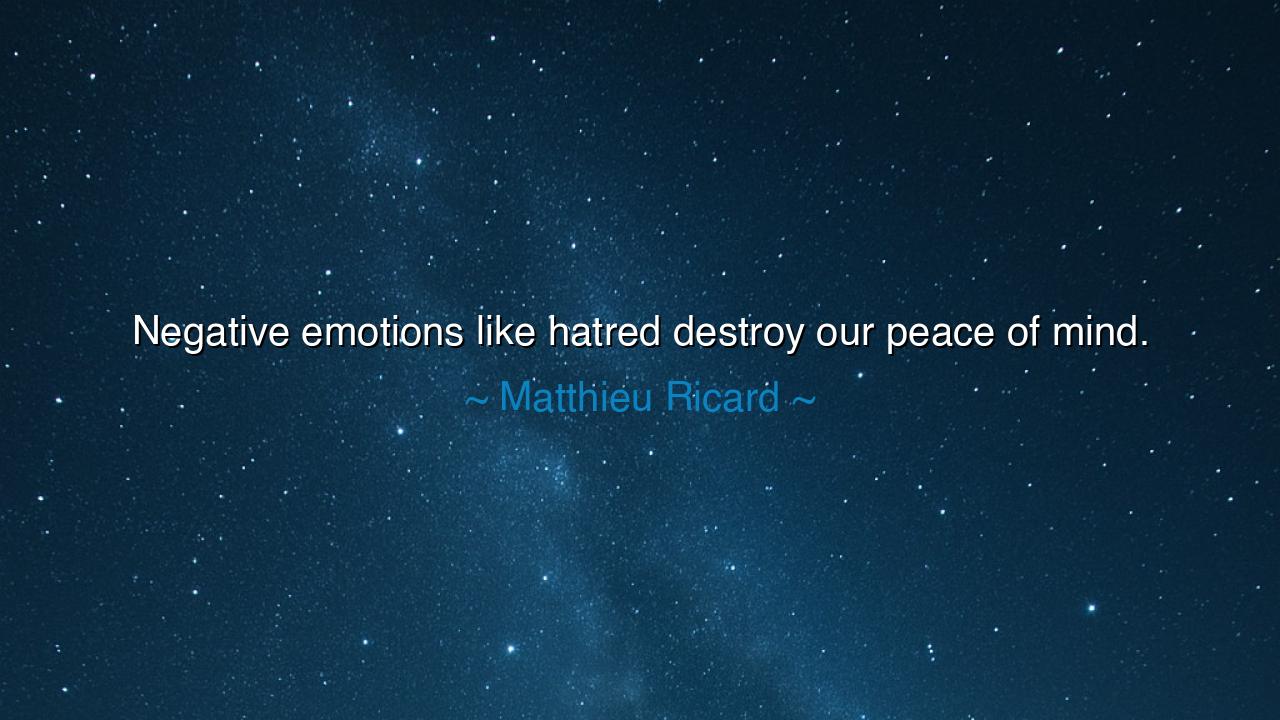
Negative emotions like hatred destroy our peace of mind.






Hear the words of Matthieu Ricard, monk, philosopher, and servant of compassion, who declared: “Negative emotions like hatred destroy our peace of mind.” In this simple phrase rests a truth older than mountains, a truth known to sages of every age: that the greatest battles are not fought upon fields of earth, but within the chambers of the heart. To harbor hatred is to drink poison and expect another to die. To cling to anger is to set fire to one’s own dwelling while cursing another’s shadow. Ricard warns us that before hatred destroys the enemy, it first destroys the bearer.
The ancients spoke of this often. The Buddha taught that holding onto anger is like grasping a burning coal to throw at another—you are the one who is burned. The Stoics of Greece and Rome declared that no external enemy can enslave us, only our own passions when ungoverned. To let negative emotions rule is to surrender sovereignty over the soul. Thus Ricard, who has studied both science and spirit, points us back to this timeless wisdom: the key to freedom is mastery over the storm within.
Consider the life of Nelson Mandela. He was unjustly imprisoned for twenty-seven years, his youth stolen, his people oppressed. By logic, his heart should have been filled with hatred. Yet when he emerged, he refused to let bitterness consume him. He said, “As I walked out the door toward the gate that would lead to my freedom, I knew if I didn’t leave my bitterness and hatred behind, I’d still be in prison.” Here is Ricard’s truth incarnate: to cling to anger is to remain bound; to release it is to reclaim peace of mind and, in turn, to change the world.
But beware—the path is not easy. Negative emotions are cunning; they whisper to us that hatred is strength, that anger is power, that revenge is justice. Yet these are lies. Hatred clouds judgment, weakens the heart, and blinds us to the humanity of others. It makes us restless even in safety, bitter even in joy, poor even in abundance. True power lies in calm, true clarity in compassion, true strength in forgiveness. This is why Ricard insists: if we value peace, we must guard our minds as warriors guard their citadels.
The meaning also runs deeper into our daily lives. One need not be a king or prisoner to understand this truth. A family torn by resentment, a workplace poisoned by jealousy, a friendship corroded by anger—these too are examples of peace of mind destroyed by negative emotions. The battlefield is not far away; it is wherever the heart clings to hatred. And the victory is not loud, but quiet—the calm of one who chooses patience over rage, understanding over judgment, love over fear.
The lesson, then, is clear: do not let hatred make its home in you. When it knocks, do not open the door. When anger rises, breathe until it passes. When bitterness tempts you, remember the cost—it steals your peace of mind, which is more precious than gold. Practice compassion daily, not as weakness but as discipline. Train your heart as one trains the body: with repetition, endurance, and care, until peace becomes your natural state.
So, children of tomorrow, carry Ricard’s wisdom into your bones. The world will offer you many reasons to hate, many wounds that invite bitterness. But remember: hatred punishes first the one who carries it. Choose instead the higher road—release, forgive, and cultivate compassion. For in doing so, you will preserve the most sacred treasure of all: the peace of mind that allows you to live fully, love deeply, and walk freely in the light.






AAdministratorAdministrator
Welcome, honored guests. Please leave a comment, we will respond soon